
In This Guide:
- What is a 10x Developer?
- 10x Developers in 2025 vs. 10x Developers in 1968
- Why should you become a 10x Developer (or even a 2x or 5x)?
- Step 1: Learn how to learn more effectively
- Step 2: Make your life easier, learn to use generative A.I. tools
- Step 3: Get more proficient in your current programming language
- Step 4: Use what you’ve learned!
- Step 5: Stay up to date with industry trends and developments
- Step 6: Expand your current skill set
- Step 7: Improve your collaboration and communication skills
- Step 8: Make sure to keep a good work-life balance
- Are you ready to become a 10x Developer?
Do you want to be the best developer you can be?
The one that management loves, the one that your peers respect and love working with, the one getting all the best job offers, the one always getting a raise.
And the one the other devs are whispering about in fear and jealousy?!

Just kidding, this is one of the most common misconceptions about what the term 10x developer actually means. It isn't just producing 10x the output as another dev or being the best by some random metric.
Trust me, that's not what being a great developer is all about, especially with the new AI tools that will help great developers be more productive than ever.
So if you're only advantage is simply trying to work harder than another dev, you're in trouble.
The term 10x developer might sound a bit cringe at first but stick with me. Especially if you want a higher salary, more job offers, more respect, and better job security.
And no... you don't have to be some kind of unicorn/genius or work so hard that you don't have a life.
So let's start by clearing up exactly what a 10x developer actually is and then I'll tell you how to become one.
What is a 10x Developer?
The term "10x Developer" has been a buzzword in the software development industry ever since the early 2000’s.
What's funny is that it comes from much further back than that.
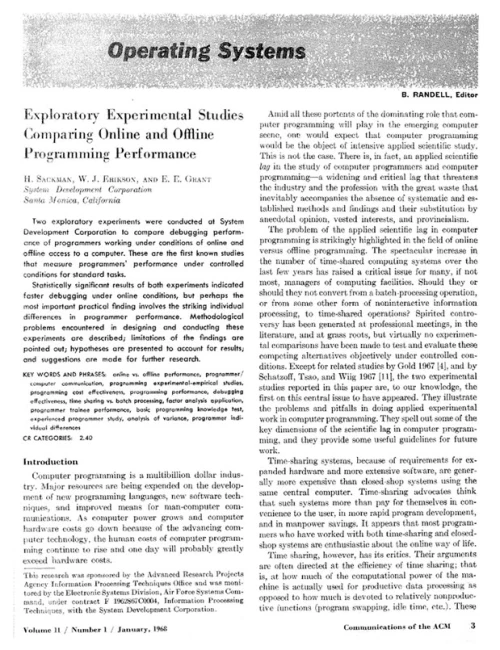
In a 1968 study by Sackman, Erikson, and Grant for the Advanced Research Projects Agency, they found that the most productive developers in their tests had an output of almost 10x more than average.
The thing is, it wasn’t always the most experienced devs that were producing this 10x output. Some were juniors or even fairly new!
(You shouldn't call yourself a junior developer anyways).
And so they came to the conclusion that this 10x performance was less about experience, and came down to other external factors - they just didn’t know which.
The good news however, is that since then, there have been numerous studies across multiple divergent fields into what makes a high performer.
Habits and systems are almost always a key commonality of these high performers.
I highly recommend watching this video for not only motivation, but for some aha moments and deeper insights into high performance. If you want to take it further, the speaker in the video also has a book on the topic.
Not sure how to apply these to your own life?
Well, good news! Keep on reading and I’ll share some exact tips on how you can apply these same principles to become a 10x developer.
But first, let’s clear something up…
10x Developers in 2025 vs. 10x Developers in 1968
It’s important to understand that the concept of a 10x developer today, isn’t the same as that initial assessment in 1968.
The term has evolved, and no longer refers to people who can crank out ten times as much code, nor is it a focus on productivity above all else.
That's the common misconception. It’s not about creating 10x more.
It’s about being 10x better across the board.
For a long time, many people thought that the 10x developer term represented the exact opposite of what a 10x dev is. It was someone who made their teammates look bad, created a toxic work environment, and led to hero worship.
But the reality is, a 10x developer is someone with the following attributes:
- They are a well-rounded and efficient developer
- They work well in a team, and help lift every member - not make them look bad
- They keep learning throughout their career. But, they also make sure to learn the right things and ignore distractions, as their time is important
- They focus on systems and tools to make their daily work and continuous learning easier
- And they have a good work-life balance
Can you see why I said these devs do so well?
Any team lead will look at these people and see the impact they have on the entire team, and it’s a no-brainer to do everything they can to keep them on board.
Why should you become a 10x Developer (or even a 2x or 5x)?
I mentioned job security, and more money, right?
Well, the other added benefit is that in the long run, it’s actually less effort to be a 10x developer (kind of).
What I mean by this is that a lot of people who reach this level, don’t do it out of a drive to be the best (usually), but instead, they do it because they’re ‘smart-lazy’.
Don’t get me wrong, they get their work done, but not because they sit at their desk longer than anyone else. Instead, they’re always looking at ways to improve by 1% to make their life and work easier:
- What small added effort can they do now, to reduce the overall effort down the line?
- What bottlenecks can they remove?
- Where can they compound their efforts?
- What can they automate to reduce downtime?
- What can they use to help with repetitive tasks?
- What can they learn to improve their code performance and what can they ignore?
It might mean spending an extra hour here or there, but it all results in a greater impact on every area of their work, and more free time.
Case in point, we ran an in-house study of A.I. tools and their impact on over 3,000+ devs, engineers, team leads and more.
We found out a lot of interesting stats but here are 2 things that I think are most important, in the context of becoming a 10x developer:
- 36.6% of the people that we surveyed who had never used AI tools before, were hesitant to get started because of the learning curve. It’s another thing to learn right?
- However, the people who were the most productive (and probably had a lot more free time afterward) had embraced AI tools more than others
In fact, some of these people were so productive and on top of the trend, that they were using these tools to automate anywhere from 30-90% or more of their work!
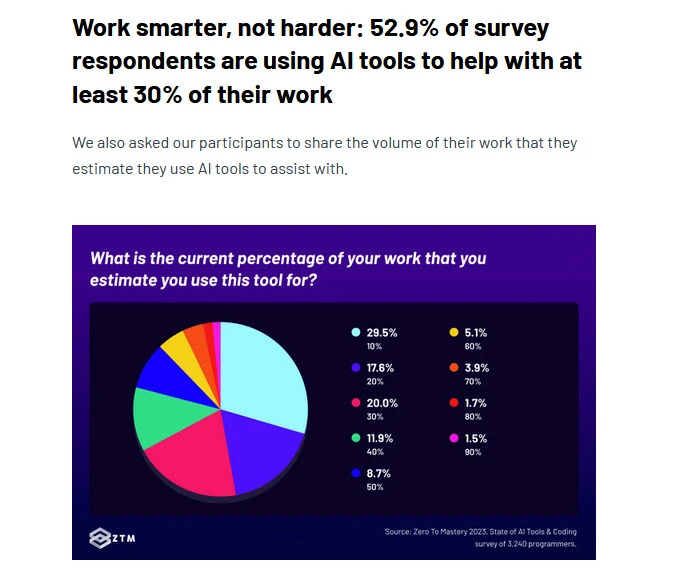
Sure, they had to learn to use the tools and probably spent a few weekends tweaking and getting it up and running, but now they’re laughing.
More free time, higher output, and a whole new skill set in a high-demand market. (No joke - Prompt Engineering is exploding right now).
TL;DR
Becoming a 10x developer shouldn’t just be a pipe dream goal. It should be something you actively work towards now, so you can make your work and life far easier going forward.
It’s not about being amazing at everything either. It’s about small incremental improvements over time in multiple areas.
It's not rocket science. There are some clear steps you can start taking now.
Step 1: Learn how to learn more effectively
Spoiler alert, but a big part of being one of the most effective in a field, is by staying up to date and learning new things.
However, the problem that the majority of people have, is they don’t have any systems in place for how to learn effectively.
Most of us learn simply from the experience or structure that we had in school.
You show up, are told things, and then you try and remember as much about the topic for a test at set intervals.

This method isn’t great.
In fact, in an 1885 study by Hermann Ebbinghaus at the University of Berlin, he found that we forget 95% of what we learn, just 3 days after learning it.
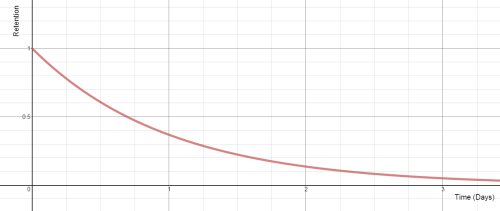
However, he did find that the retention of those memories improved, when you repeated the content after a short period of time.

The thing is, this is just one technique of many that you can use to improve your skills, for not only remembering and managing new topics, but also learning them in the first place.
That's why I highly recommend that you learn how to learn more effectively.
It seems like a detour but this is exactly like what I was saying with the people who learned the A.I. tools. It took them a little longer upfront, but the compound effect after was huge, and it’s the same for this.
As well as new learning techniques, I also recommend you add in some specific habits around your learning.
Set a dedicated learning time
Make sure you set a specific time each week dedicated to learning. This regular, consistent habit can help ensure that you're continually expanding your knowledge and skills.
It also helps if you can tie this time into something else you might usually do, as you’ll be more likely to form the habit.
For example
If you go to the gym on Tuesday nights, then right after you get home would be a great period of focus for an hour.
Let your current first habit build the second one.
Create a productive learning environment
Environment shapes action.
For example
If you have snacks at the front of the cupboard, you’re more likely to eat them. Likewise, if your phone is in arms reach, you’re more likely to pick it up when distracted.
This is why you need to create the ideal environment for your 10x activities and learning:
- Remove things from your desk that are not part of what you’re doing. Especially anything that can pull your attention away
- Get some noise canceling headphones
- Add a site blocker plugin to your browser, and have it set to stop access to any sites you might browse when distracted
- Make sure you have a comfortable chair and good lighting, and all your learning materials accessible
- And put your phone in another room!
Commit to a growth mindset
Finally, understand that skills are built, not born. Every expert was once a beginner, and it’s only from consistent effort and practice, you can become one too.
That’s the key thing to remember - It’s not an overnight change, but small changes overtime that all add up.
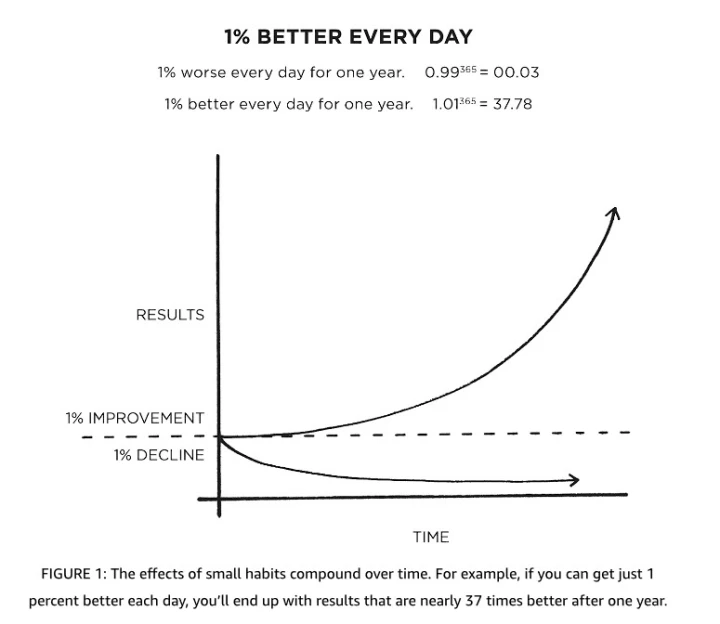
Become a 2x dev, then a 3x, and work your way up over time.
TL;DR
You’re going to spend the rest of your career in tech, having to learn new things - so why not learn how to make it stick, and commit less overall time to it?
Step 2: Make your life easier, learn to use generative A.I. tools
A.I. tools are here to stay. Before long, learning them won't be a choice, it'll be required if you want to keep up. Learning them now can be a huge benefit if you learn to use them properly.
They’re not perfect and aren't a replacement for core knowledge and experience, but they will help you automate and fast-track a lot of what you’re already doing.
Watch the workshop below I did for ZTM Academy students (I ended up making it free for anyone to watch).
After you've done that:
- Learn the basics of how LLMs work
- Learn how to use the ChatGPT code interpreter
- Learn how to use GitHub Copilot
Then, start playing around and looking at ways you can use these A.I. tools in with your work to help you improve your current processes:
- You could have it document all your code changes
- Debug your code for errors
- Write commands
- Or even solve Git issues
- And so much more
Just think of the amount of time you would save each year, and this is just the tip of the iceberg!
PSA: We've been releasing new AI related courses every month for members of the ZTM Academy. If you want to learn to build with AI and stay up-to-date with the latest new tools and changes, then come join us.
Step 3: Get more proficient in your current programming language
If you want to be great at a language, then you need to not only use it often, but also learn more about it, because the more you know, the easier it will be to use, and the better you’ll understand its strengths and weaknesses.
Learn more about your language
Go beyond the basics. Learn about more advanced or niche features of your language that can help you write more efficient and effective code.
Check out the official documentation and new features, take more advanced courses, or simply dive deeper into any training you’ve already done before and push yourself to grasp things you might not have fully understood.
Focus on efficiency
Make sure you're writing code that's not just functional, but also efficient. This involves choosing the right data structures, algorithms, libraries, and language features.
If you’re not sure which of these are best for your chosen language, then this is definitely something to look up and learn. Find out why these are the best also.
This is just one reason why I recommend learning System Design - even as a junior developer.
Ensure your code is reliable
Write code that's reliable and works as expected under a variety of conditions and handles errors gracefully. This often involves rigorous testing, including unit tests, integration tests, and end-to-end tests.
Maybe put those pair programming tools to the test and have them assess your code for potential improvements!
Create shortcuts
Use scripts, automation, and version control systems to ensure that your code runs the same way every time and that your work is easily replicable by others.
You’re already using those A.I. tools, so why not see if you can use them for this also? It’s going to seriously cut down your time, while also ensuring higher quality output.
Make sure your code is easy to debug
Finally, make sure to write clear, well-documented code (another possible task for those tools) that's easy to understand, troubleshoot, and maintain.
This can save you and others a lot of time and frustration down the line.
Step 4: Use what you’ve learned!
One of the best ways to both improve your skills and retain new information, is by applying it!
Build more projects
Building projects is one of the best ways to learn and practice. It gives you a chance to apply what you've learned, encounter real-world challenges, and create something tangible.
You should have already been looking at more advanced topics, as well as pair programming with your A.I. tool of choice. Go ahead and build them, learn, and then add them to that portfolio.
Contribute to Open Source projects
Another great way to both learn and network is to work on open source projects.
This can give you experience working on large codebases, collaborating with others outside of your work environment, and the chance to learn from more experienced developers.
Plus, it's a great way to give back to the community and can be another valuable addition to your portfolio.
Step 5: Stay up-to-date with industry trends and developments
As well as staying on top of developments in your current programming language, you should also stay on top of what's happening in your particular industry. This way, you’ll have a better idea of emerging trends and opportunities.
This can easily be done through following relevant people and brands on social media, reading industry blogs, podcasts, and subscribing to curated newsletters.
And if you want to take it a step further, you can also attend meetups, conferences, and webinars.
Step 6: Expand your current skill set
So far you’ve been polishing and improving your current skills, but I also recommend you add in new ones.
Learn new languages
Don't limit yourself to just one or two languages. Expanding your skillset to include more languages can make you a more versatile developer and open up new opportunities.
It can also help you pick up complimentary skills that will help your day to day work.
Understand the full development cycle
Consider learning about areas beyond coding, such as system design, Cybersecurity, project management, and DevOps.
These will give you a more holistic understanding of software development and make you a more valuable contributor to any project or team.
Learn new models for solving problems
Different problems call for different solutions.
But the thing about this, is that you only know how to solve a problem, based on your current world experience.
That’s why you should look at adding in new experiences from other fields (like we mentioned above), so that you might find totally new solutions.
For example
Richard Feynman was a renowned physicist known for his contributions to quantum mechanics, quantum electrodynamics, and particle physics, among other areas.

He was known for a lot of things, but the main one was his remarkable problem-solving abilities and unconventional approaches to physics problems.
He stated that his unique perspective and creativity often allowed him to find elegant solutions to seemingly insurmountable challenges.
The reason for this is because he loved to learn about multiple topics. This wider range gave him new models of thinking and helped him come up with solutions than his peers would miss.
I remember a story about him as a lecturer at a University.
He was going to lunch with some Maths professors, and they were currently struggling with a math problem. Fenyman solved it almost immediately, thanks in part, to being an unruly child.
Basically, because he was smart, he was also a pain at school sometimes, and so his teacher would make him sit at the back of the class and read very old math textbooks that were no longer taught, just to keep him entertained.
The thing is, these books had methods for solving problems that were pretty unheard of by current people at the time. This is why he could solve that Math problem that was stumping the other lecturers, because he had different problem solving tools!
Sidenote: He also had great views on how to learn anything, and even has a method named after him:
TL;DR
Becoming a 10x developer isn't about knowing everything — it's about having a solid foundation and the ability to learn and adapt to new technologies, methodologies, and best practices.
Constantly expanding and updating your skillset (otherwise know as 'skill stacking') is a key part of this process.
I’m not saying you need to go learn microbiology, but why not go a little broader than your current skill set?
Even within programming you could learn about different programming paradigms, such as functional, procedural, or declarative programming.
At the very least, you’ll learn something new. Or, it might even enhance your problem-solving skills when it comes to your daily work.
Step 7: Improve your collaboration and communication skills
Software development is a team effort, and so being able to work effectively with others - whether it's understanding their code, reconciling different viewpoints, or coordinating efforts - is crucial.
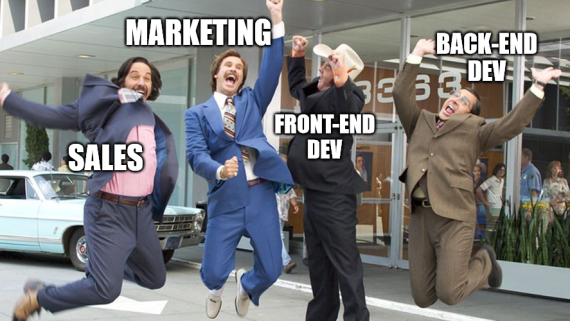
This means that while technical skills are critical, "soft skills" are just as important.
Make sure to actively listen
Communication isn't just about talking - it's also about listening.
So when working with a team or interacting with clients, strive to understand their perspective and take their input into account. This can lead to better solutions and a more harmonious working environment.
(It’s partly why we recommend expanding your skills into system design, as well as UX - so that you can understand the needs of others on your team).
It might seem woo woo, but having empathy and considering the needs and feelings of others is an important part of effective communication. This can help in building better relationships with your team and clients, and fostering a positive working environment.
Try to communicate more clearly
We can be guilty of being a little introverted in tech, but you have to get past this if you want to work well in a team.
Whether this means writing clearer code comments, explaining complex concepts in simple terms, or articulating your ideas effectively, good communication skills can all make a big difference.
Handle feedback positively
Finally, knowing how to give and receive feedback constructively is also a key part of working within a team.
Not only that, but it can also help you identify areas for improvement and become a better developer.
TL;DR
Remember, being a 10x developer isn't just about writing great code — it's also about being a great teammate and collaborator.
And so by honing your collaboration and communication skills, you can become a more effective and influential member of your team and have a bigger impact on your projects.
Step 8: Make sure to keep a good work-life balance
It's essential to remember that becoming a 10x developer isn't about working 10 times harder - it's about working smarter.
This means that it’s vital to maintain a healthy work-life balance that can sustain your career in the long run.
Make time for your health and wellness
Maintaining good physical and mental health is crucial for productivity, so regular exercise, a balanced diet, and ample sleep are all part of this.
Take regular breaks and time off
It's important to know when to step away from the computer and recharge, so be sure to take regular breaks so you can prevent fatigue and burnout.
Practice mindfulness and manage your stress levels
Mindfulness and meditation can help manage stress and enhance focus and clarity. Not only that, they can also help you function at a much higher level.
No joke, every high performer that I know that has everything in balance, while also being successful, makes time for meditation.
It’s like a reboot for the brain hardware. Close those tabs and help that head run more efficiently!
And don’t forget to make time for life outside of work!
It’s great to enjoy programming and want to learn more, but try and add in other interests away from the desk.
Pursuing hobbies and spending time with loved ones can provide a vital counterbalance to the rigors of a demanding career.
For example
You could try jiu jitsu. It’s great exercise, usually a good community (good for building communication skills), and it’s very much like chess - so it's great for analytical thinkers.
Oh, and add the fact that it’s hard to think about work when you’re rolling around on the floor trying to choke each other 😬!
TL;DR
The path to becoming a 10x Developer is a marathon, not a sprint, so make sure to make time for yourself and your health.
You’ll reap far more rewards and enjoy the journey much more.
Are you ready to become a 10x Developer?
Follow the steps outlined above and you'll become a 10x Developer. It takes more effort upfront but the rewards are worth it.
Remember to:
- Embrace Change: Be open to change, whether it's a new technology, a new project requirement, or a change in the team dynamic. Adaptability is a valuable trait in a developer, and it actually helps lower stress
- Improve Incrementally: Don't strive for overnight transformation. Instead, aim for consistent, incremental improvement. Even a 1% improvement each day can lead to significant growth over time
- Stay Curious: Maintain a sense of curiosity and a hunger for learning. This will drive you to explore new technologies, methodologies, and best practices, and keep improving, but don’t forget to learn how to learn more effectively!
- Learn from Mistakes: Don't be afraid of making mistakes, because they're a natural part of learning and improving. In fact, you can’t learn unless you’re willing to make a mistake! What's important is to learn from these mistakes and turn them into opportunities for growth
- Seek Feedback: Regularly seek feedback from your peers, superiors, and subordinates. Use it to identify areas for improvement and work on them
- And always look for ways to improve - Not just from a personal perspective, but with every task you’re doing. The more you can simplify or automate tasks, the less you have to keep doing yourself. It’s a highly underrated skill.
You’ve got this! The trick is to get started today and just make those small improvements over time, so get started now.





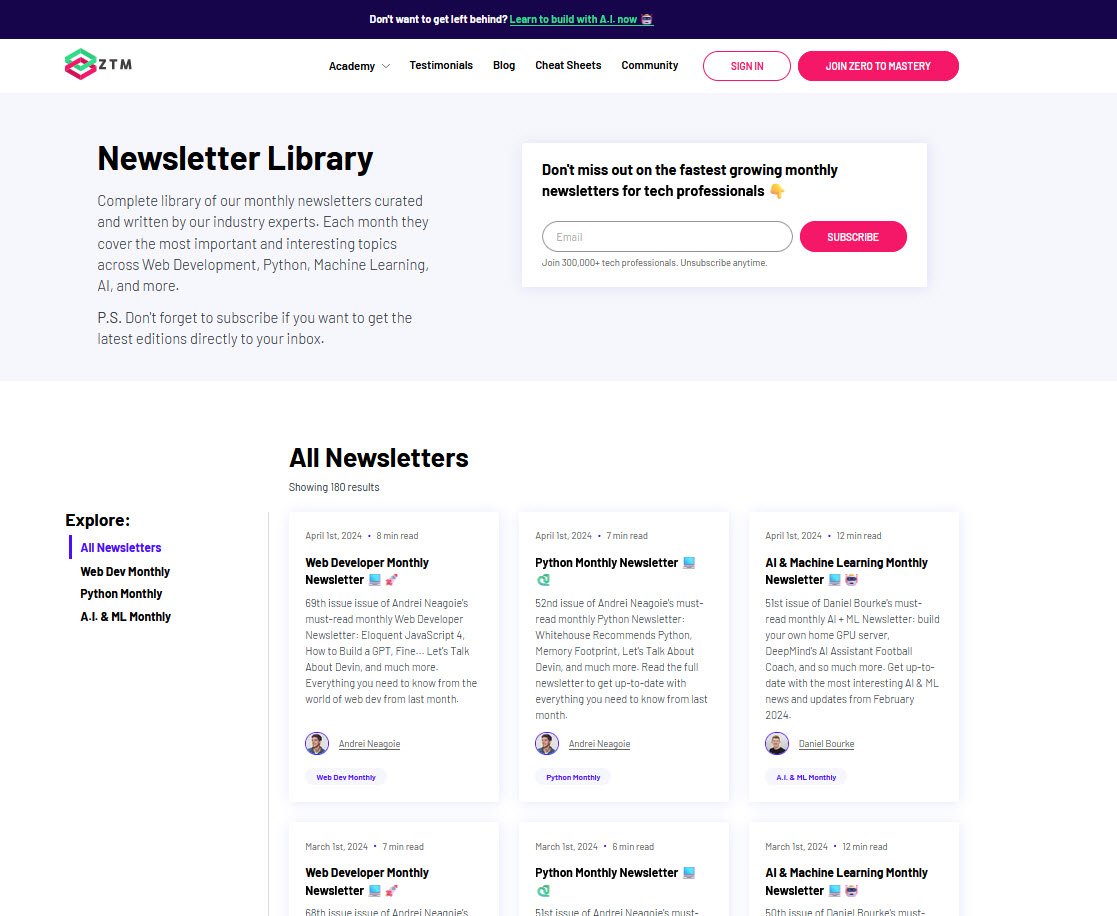



![Learning to Learn [Efficient Learning]](http://images.ctfassets.net/aq13lwl6616q/6VWcUgLgG0SU55ORlILe2S/e186361aeb48561bcd19ae6486577022/Learning_to_Learn.jpg?w=400&fm=webp)





